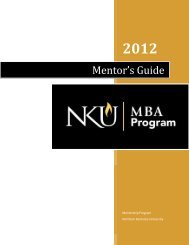Mentee's Guide - Haile/US Bank College of Business - Northern ...
Mentee's Guide - Haile/US Bank College of Business - Northern ...
Mentee's Guide - Haile/US Bank College of Business - Northern ...
Create successful ePaper yourself
Turn your PDF publications into a flip-book with our unique Google optimized e-Paper software.
2012<br />
Mentee’s <strong>Guide</strong><br />
Mentorship Program<br />
<strong>Northern</strong> Kentucky University
Mentee’s <strong>Guide</strong> 2012<br />
NKU <strong>Haile</strong>/U.S. <strong>Bank</strong> <strong>College</strong> <strong>of</strong> <strong>Business</strong> MBA<br />
MENTORSHIP Program:<br />
Mentee’s <strong>Guide</strong><br />
To our Mentees: Why have a Mentor:<br />
The NKU MBA Mentorship Program is designed to provide you<br />
with resources to:<br />
Receive guidance, advice, and encouragement from a business<br />
pr<strong>of</strong>essional in issues like career planning, conducting a job<br />
search, balancing work and family, etc.<br />
Increase your awareness <strong>of</strong> the variety and scope <strong>of</strong> economic<br />
activities through increased exposure to the business<br />
environment.<br />
Help you develop a better sense <strong>of</strong> career options and career<br />
strategies and gain insight into the day-to-day work <strong>of</strong> a<br />
pr<strong>of</strong>essional in a field <strong>of</strong> interest.<br />
Help you develop personal traits that are important for success<br />
through interaction with mentor.<br />
Obtain knowledge that helps you to define internship<br />
opportunities and career goals.<br />
Give you a confidant to whom you can talk about your concerns<br />
or ideas.<br />
Expand your pr<strong>of</strong>essional network<br />
Further develop communication and networking skills<br />
Provide a practical forum where academic concepts can be<br />
discussed and tested<br />
2 | P a g e
Mentee’s <strong>Guide</strong> 2012<br />
Increase knowledge <strong>of</strong> a specific industry and pr<strong>of</strong>ession<br />
Mentees’/Students’ Responsibilities:<br />
The responsibility is on the mentee to initiate and maintain<br />
communication with their mentor.<br />
Mentees are expected to act in a responsible, ethical and<br />
pr<strong>of</strong>essional manner at all times.<br />
Mentees must keep in periodic communication with the<br />
Mentor Program Coordinator and submit report on the<br />
mentorship experience at the end <strong>of</strong> the year.<br />
Mentees should understand the mentor’s expectations <strong>of</strong> him /<br />
her and <strong>of</strong> the mentor/mentee relationship.<br />
Preparing for your role in the mentoring relationship<br />
Your mentor will be giving his/her time to share experiences,<br />
perspectives and approaches to developing personally and<br />
pr<strong>of</strong>essionally. He/she will assist you in achieving your goals by<br />
answering questions, providing insight into particular roles,<br />
organizations and / or industries, assessing your strengths and<br />
weaknesses. You should actively seek feedback from your mentor<br />
and be receptive to the feedback you are <strong>of</strong>fered. Be as specific as<br />
possible when asking for information, ideas and suggestions.<br />
Managing the mentor relationship<br />
You should take the responsibility for setting up meetings with your<br />
mentor.<br />
3 | P a g e
Mentee’s <strong>Guide</strong> 2012<br />
While face-to-face meetings are suggested, you can also use e-mail,<br />
letters, phone or instant messaging as methods to maintain<br />
communication with your mentor. Be sure to show up for scheduled<br />
meetings on time. For each meeting, be prepared with a prioritized<br />
list <strong>of</strong> topics or questions that you want to discuss.<br />
If necessary, <strong>of</strong>fer to reschedule a meeting, shorten it, or handle your<br />
questions over e-mail. Be flexible as your mentor is volunteering his<br />
or her own time, but remain committed to achieving your goals from<br />
the relationship.<br />
Tips<br />
These practical strategies can help you build a relationship with<br />
your mentors:<br />
Remember that you own your development, your mentor<br />
doesn’t. It’s up to you to identify objectives as well as keep the<br />
relationship focused and moving forward.<br />
Use active listening skills in discussions with your mentor.<br />
Be prepared to ask for specific advice on your skill set, ideas,<br />
plans, and goals. The more specific you are, the easier it will be<br />
for your mentor to respond.<br />
Be complete yet succinct in your comments and explanations.<br />
Make it easy for your mentor to give you honest, specific<br />
feedback. Ask for it early in your relationship.<br />
If you get some corrective feedback, don’t defend yourself.<br />
Thank your mentor for being honest with you. Then ask for<br />
suggestions on how you can improve.<br />
4 | P a g e
Mentee’s <strong>Guide</strong> 2012<br />
Self-Evaluation: Clarify Your Interests and Needs<br />
Before meeting your mentor, you should start by first undertaking a<br />
critical self-evaluation.<br />
For example:<br />
What are the personal and pr<strong>of</strong>essional goals I have for this<br />
mentoring relationship?<br />
What would I like to learn from this experience?<br />
What are questions I have about this industry?<br />
What are questions or concerns I have about career?<br />
What are my strengths?<br />
What skills do I need to develop?<br />
VALUES/LIMITATIONS <strong>of</strong> the Relationship:<br />
Like any relationship, this match involves an active process in which<br />
the uniqueness, individuality and expertise <strong>of</strong> each member <strong>of</strong> the<br />
pair needs to be respected. Your mentor will <strong>of</strong>fer you lessons from<br />
his / her experience, information, and suggestions on how to<br />
approach and solve various issues. Be open to the information you<br />
are <strong>of</strong>fered. Recognize that some advice may seem irrelevant to you<br />
at this time, but you may find it useful later on. Other suggestions<br />
may not fit your particular personality style or approach. It will<br />
ultimately be your choice as to how you will weave the insights<br />
gained into your own evolving style.<br />
5 | P a g e



